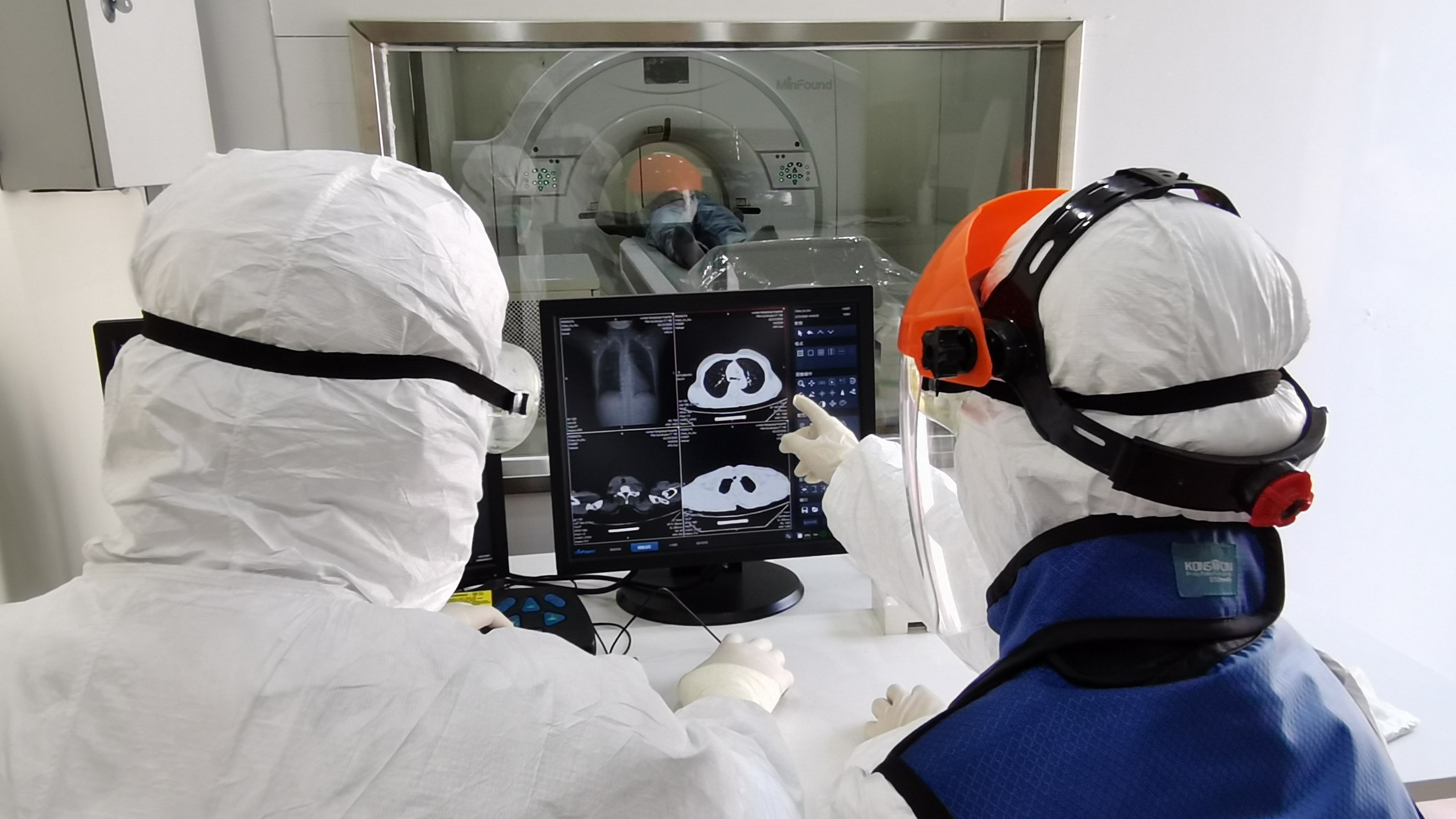
Medical workers are checking a patient's CT image with a movable CT machine at the "Wuhan Livingroom" temporary hospital in Wuhan, central China's Hubei Province, February 23, 2020. /Xinhua
Medical workers are checking a patient's CT image with a movable CT machine at the "Wuhan Livingroom" temporary hospital in Wuhan, central China's Hubei Province, February 23, 2020. /Xinhua
Editor's note: David Lee is a Beijing-based consultant and author mainly writing about energy, health, international politics and international development. The article reflects the author's opinions, and not necessarily the views of CGTN.
Cloud-based events are in the vogue. The fourth installment of the World Intelligence Congress (WIC) comes to town this week to feature much sought-after insights from top industry experts, who have virtually gathered in the Tianjin-based event to discuss how intelligence shapes the digital future of world.
To address the ongoing COVID-119 public health crisis, the WIC includes sessions on empowering health workers with intelligent technologies to fight the pandemic, as well as other general topics on smart healthcare in the digital age, such as the use of 5G in healthcare delivery.
A key highlight of the event is the power of intelligent platforms. Actually, it is amid the ongoing challenges posed by the COVID-19 pandemic that the power of intelligent platforms becomes even more conspicuous.
There are two dimensions of such power.
The first dimension relates to the gathering of people and ideas to share insights and exchange ideas. The WIC, together with many other high-profile events including Apple's WWDC 2020 that takes place on the cloud, continues to offer the key platforms necessary for cultivating and inspiring individual and collective human creativity.
In fact, such high-profile events taking the virtual form cover even wider circles of creative minds than previous physical events, with contents of all sessions available for live participation or easy access later on.
Not coincidentally, Facebook has previously announced to cancel all large-scale in-person physical events through June 2021. The trend is obvious. Influential industry events must transform into intelligent platforms to serve better the needs of the times.
More importantly, being intelligent platforms to link up people and ideas, influential industry events must help create platforms to help fight the viral outbreak, and hence comes the second dimension of the power of intelligent platforms.

A Boston Dynamics SpotMini robot walks through a conference room during a robotics summit in Boston, Massachusetts, the United States, May 24, 2018. /AP
A Boston Dynamics SpotMini robot walks through a conference room during a robotics summit in Boston, Massachusetts, the United States, May 24, 2018. /AP
When humankind is working to overcome the COVID-19 crisis, two levels of intelligent platforms come to help.
At a lower level, a small-scale platform like the one offered by Boston Dynamics in the form of its pioneering "robotic dog" Spot, further innovations can be developed and implemented in a common base design to carry out custom tasks. For instance, building on further custom development, Spot can be used to carry out COVID-19 testing, thus significantly reducing the risk of contagion.
At a higher level, larger-scale platforms may involve the sharing of big data between connected devices, systems, institutions, and even national governments. Also, larger-scale platforms, particularly those linked with underlying infrastructure and with built-in interconnectivity, can be used to trace contacts, to develop drugs and therapies, and to accelerate vaccine development, among other key tasks that help fight the ongoing public health crisis.
Despite the disruptions caused by the COVID-19 pandemic, we are living in an era of big ideas, great innovations, and bold applications. The multiplicity of ideas, innovations, and applications are exciting enough, but to maximize their good effects, we need great platforms to connect the dots and create bigger synergy.
That said, great platforms are to be used by people. At WIC, the generous and proud host in Tianjin is ready to share insights on the user end of the story about the buildup of a smart city using intelligent platforms, including aspects on smart healthcare and pandemic control work.
OECD statistics show that the ratio of the world's urban population is expected to increase from 55 percent in 2018 (some 4.2 billion people) to 68 percent by 2050, which will mean that the world's urban population will nearly double. By 2100, some 85 percent of the population will live in cities, with urban population increasing from under one billion in 1950 to nine billion by 2100.
The striking statistics mean cities are the key users of intelligent platforms to serve their citizens. In the short term, cities must seek the help of intelligent technologies to fight the pandemic. In the long term, smart cities built on intelligent platforms will grow and shape future lives.
The digital era is the era of intelligent platforms. Of course, the power of intelligent platforms is not restricted to pandemic control, a lot more will be done and the limit is only mankind's imagination.
(If you want to contribute and have specific expertise, please contact us at opinions@cgtn.com.)